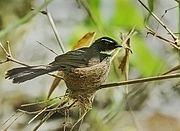White-throated fantail
| White-throated fantail | |
|---|---|

| |
| In Uttarakhand, India | |
| Scientific classification | |
| Kingdom: | Animalia |
| Phylum: | Chordata |
| Class: | Aves |
| Order: | Passeriformes |
| Family: | Rhipiduridae |
| Genus: | Rhipidura |
| Species: | R. albicollis
|
| Binomial name | |
| Rhipidura albicollis (Vieillot, 1818)
| |
The white-throated fantail (Rhipidura albicollis) is a small passerine bird. It is found in forest, scrub and cultivation across tropical southern Asia from the Himalayas, India and Bangladesh east to Indonesia. The white-spotted fantail (R. albogularis) until recently was considered a subspecies.
Description[]
The adult white-throated fantail is about 19 cm long. It has a dark fan-shaped tail, edged in white, and white supercilium and throat. There is otherwise much variation in plumage between races. Most resemble the Himalayan R. a. canescans which is mainly slate grey above and below, with a black eye mask, and a white throat and eyebrow.[citation needed]
Local names for the bird in India include Nasoni sorai (Assamese).
Behaviour[]
The white-throated fantail lays three eggs in a small cup nest in a tree. It is insectivorous, and often fans its tail as it moves through the undergrowth.
The eggs are approximately 2 cm in length. They are white in colour, with a band of brown spots around the middle, closer towards the base of the egg.
Birds use the same song year after year, with progressively small changes, with the result that the song sounds very different after 4–5 years. The male's call is a valuable tool in detection and identification of the bird, which can often be confused with the white-browed fantail, R. aureola, where their ranges overlap. R. aureola has light underparts and prominent spots in two rows on the wings.
Gallery[]
References[]
- ^ BirdLife International. 2016. Rhipidura albicollis. The IUCN Red List of Threatened Species 2016: e.T103709726A94090200. https://dx.doi.org/10.2305/IUCN.UK.2016-3.RLTS.T103709726A94090200.en. Downloaded on 10 December 2018.
- Birds of India by Grimmett, Inskipp and Inskipp, ISBN 0-691-04910-6
- IUCN Red List least concern species
- Rhipidura
- Birds of the Himalayas
- Birds of East India
- Birds of South China
- Birds of Southeast Asia
- Birds described in 1818


